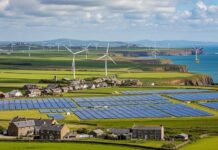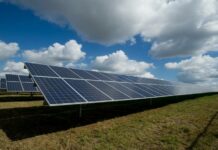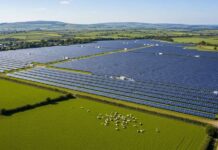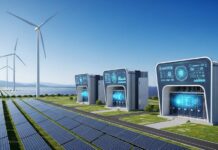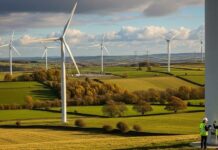Data centers happen to be of utmost importance in this digital age as they silently go on to support the internet during the major increase in data volumes as well as the rising environmental concerns. The industry is at present experiencing a major shift, with an underscoring focus on energy-efficient designs and the latest sustainability trends.
It is well to be noted that the data centre sector is indeed going through rapid growth and is, in all likelihood, going to become a $135 billion global market in the next couple of years. This growth is majorly driven by the rising demand when it comes to cloud services, Internet of Things- IoT technologies, along with big data analytics. Given this major expansion, it is critical to stress the importance of international energy efficiency across the data centers. By making sure to execute innovative cooling methods, optimizing server designs, and also integrating renewable energy sources, it is indeed possible to accomplish a notable 40% dip in energy consumption. This reduction not only shifts towards significant cost savings but, at the same time, also contributes to a reduction in carbon emissions. The industry is primarily looking towards fostering creativity, enhancing efficiency, and also encouraging sustainability. These objectives are aimed at meeting the demands of the digital world while at the same time minimizing the environmental footprint.
Apparently, the rise of edge computing has led to a rising trend of distributed data processing, which focuses on moving data processing nearer to its source, which aids in minimizing the reliance on centralized data centers that go on to consume quite a majority of energy. Notably, strategically placed smaller as well as decentralized data centers are designed to help in building performance, minimize laziness, and also lessen their environmental impact. It is mostly seen that users often buy highly efficient chillers as well as ancillaries, yet they still go on to experience energy loss because of poor synchronization within the components, which is where smart controls come into play. By making sure to run all components at an optimized efficiency level, smart controls can go on to help users save on total efficiency and also minimize energy waste.
Innovative cooling solutions and refrigerant integration
It has been observed in the past that the data centers have consumed lots of electricity, thereby resulting in the generation of quite a substantial amount of carbon emissions. As global concerns with regards to climate change continue to build, the requirement when it comes to sustainable data centers has become very necessary and also urgent. In 2023, numerous companies as well as governments have made commitments so as to revolutionize the data center industry to lessen its environmental impact. The commitments comprise numerous actions, like transitioning to renewable energy options, elevating energy efficiency by way of innovative cooling technologies, embracing sustainable data center designs, and also setting more steep and stringent carbon emissions reduction objectives. All these measures look to foster a greener as well as a more sustainable industry.
Refrigerants that happen to have a low global warming potential- GWP happen to be crucial for promoting environmental friendliness and can go on to significantly enhance the efficiency of cooling systems. By reducing the impact of climate change and greenhouse gas emissions, they play a critical role when it comes to combating global warming and also promoting sustainability. Besides, these refrigerants regularly possess superior thermodynamic attributes that lead to enhanced cooling efficacy, which in turn goes on to reduce energy consumption, thereby leading to cost savings and also benefiting both the environment along with businesses. Transitioning to low-GWP refrigerants is a mandatory measure so as to enhance the performance of cooling systems and also minimize their environmental footprint.
It is well worth noting that sustainable data centers have in them environmentally friendly cooling systems that make use of advanced refrigerants as well as innovative technologies. These systems are designed in order to reduce carbon footprints, reduce energy consumption, and have a very low impact on the environment. This approach not only helps to enhance sustainability but at the same time elevates energy efficiency and aids in addressing traditional cooling challenges.
Ice storage capability to enhance efficiency, a valuable solution during emergency situations
Ice storage tech goes on to improve energy efficiency by way of generating and storing ice during not-so-peak hours, especially at night when electricity prices happen to be lower. The ice is subsequently used for cooling endeavors during periods that happen to be in high demand, thereby reducing the need for energy-intensive cooling. It is well to be noted that shifting energy consumption to non-peak times has numerous benefits, such as reducing costs, lessening strain on the grid, and at the same time promoting sustainability. This novel approach greatly enhances efficiency, dips emissions, and helps businesses as well as consumers save costs.
The use of ice storage capacity when it comes to enhanced efficiency goes on to offer a versatile solution in times of shortage of electricity. Initially, this system enables buildings to be pre-cooled across the low-demand hours, thereby decreasing the need for electricity throughout periods of high demand. Additionally, it goes on to guarantee cooling even at the time of power interruptions, thus maintaining the temperature-controlled environments integrity. Lastly, it enables load distribution and grid stability, thereby optimizing energy usage while also reducing the need for additional power generation.
The implementation of sustainable sourcing and circular economy practices is being supported by regulatory initiatives
The fact is that data centers are showing an enormous amount of interest in obtaining green building certifications as a way to minimize their impact on the ecology. As per the research conducted by the U.S. Green Building Council- USGBC, there does happen to be a noticeable increase in data centers that quite actively look for LEED- Leadership in Energy and Environmental Design certification. These data centers go on to place a strong emphasis on energy efficiency, reducing water usage, and embracing sustainable building practices so as to reduce their total environmental impact.
Apart from the energy footprint, sustainable data centers also look to prioritize waste reduction and sustainable sourcing. Apparently, there are several companies that are now adopting circular economy practices, involving responsibly sourcing materials for data center construction as well as ensuring proper recycling or refurbishment when it comes to electronic waste.
International organizations, governments are implementing regulations as well as standards to encourage the use of sustainable practices within the data centers. There is anticipation for the execution of stricter environmental regulations and incentives for data centers that not only meet sustainability standards but also surpass them.
The Way Forward
It is well to be noted that the trends and advancements across the sustainable data centers are expected to evolve with time. Businesses are at present making enough investments when it comes to research and development, while at the same time witnessing the elevation of innovative startups that are bringing to the fore some groundbreaking solutions.
Interestingly, the data centers of the future will be known for their intelligence, environmental amicability, as well as seamless integration when it comes to the surrounding environment.
Especially from 2023 and beyond, one can go on to expect a further rise as far as these trends are concerned. This will be driven by numerous stakeholders, like governments, equipment providers, technology companies, and society as a whole, who are placing a robust focus on sustainability. The data center industry is not just embracing a future that’s greener; it is also leading the way in setting its benchmark. The development when it comes to the future sustainable data centers will help in the creation of a world which is environmentally conscious while at the same time also meeting the rising demand when it comes to digital services.



